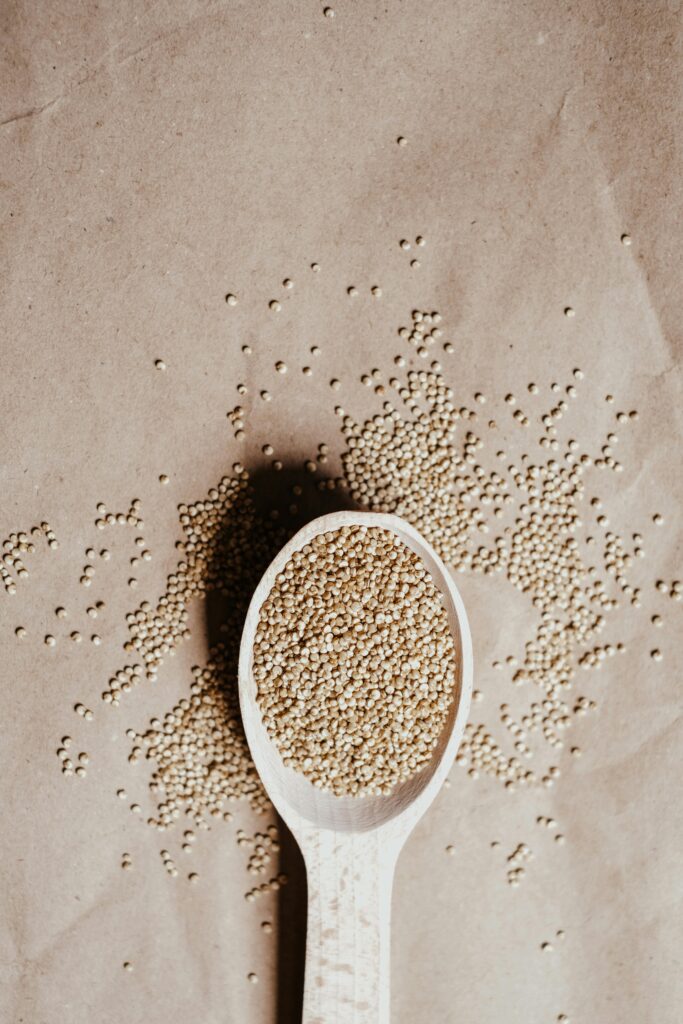Some of the links in this post are affiliate links, which means I may earn a small commission if you choose to make a purchase—at no extra cost to you. I only share products I personally use, love, or truly believe in.
Have you ever felt like something’s just off—like you’re exhausted for no reason, your muscles have a mind of their own, or you’re wired but tired at the same time?
Same! But weirdly, it wasn’t stress or dehydration for me (at least not all of the time).
And it might not just be “one of those days,” either. It might be your magnesium levels waving a little white flag. Really.
Story time: I grew up with chronic headaches and migraines. I could NEVER figure out where the source was coming from. Now, I’m not saying magnesium was the cure-all, but honestly? Since ensuring I get my daily dose of it, I have had far fewer headaches. Now, I can pinpoint most of my headaches being caused by excessive screen time or dehydration. I call that a huge win!
Sadly, magnesium doesn’t always get the headline attention like Vitamin C or iron—but trust me, it should.
This under-the-radar mineral is running the backstage of your body like a boss: relaxing muscles, calming your mind, balancing your blood sugar, keeping your bones strong… basically, making sure everything ticks along nicely.
So, today we’re diving into why magnesium is way more important than you probably realized—and the surprisingly easy ways you can start boosting your intake naturally.
(💡Hint: It involves dark chocolate).
Let’s get you feeling good again—starting with this mighty mineral!

What Even Is Magnesium (And Why Should You Care?)
Quick fact: Magnesium is a mineral your body needs for over 300 enzyme reactions (Volpe, 2013). Yeah, 300!!
We’re talking about everything from producing energy to stabilizing your heartbeat to helping your muscles chill out after a workout.
I like to think of magnesium like that super dependable friend who shows up early, stays late, and cleans up after the party without ever asking for a thank you. If you have one of those, keep them close (and give them a piece of dark chocolate, as a thank-you, of course)!
Without enough magnesium on board, things start to get a little messy.
And get this—most of us are running low on it without even realizing (Rosanoff, et al., 2012). I certainly was
(shoutout to processed foods and stress for making things harder than they need to be).
👉 Related post: Healthy for Life: Why Quick Fixes Can’t Sustain You
🎁 3 FREE Guides to Jumpstart Your Wellness Journey
Ready to feel your best — mind, body, and spirit?
Grab my free 3-in-1 Wellness Bundle, including:
7-Day Clean Eating Plan
7-Day Mental Wellness Plan
7-Day Beginner Workout Plan
✨ Plus a Secret Bonus!

Why Magnesium Is Non-Negotiable for Feeling Good
Here’s why you absolutely want this mineral on your side:
- Muscle Relaxation
Midnight leg cramps? Twitchy eye? Post-workout soreness that won’t quit?
Magnesium helps muscles contract and relax properly by regulating calcium flow in muscle cells (Volpe, 2013). Without enough, your muscles act like toddlers who missed naptime. Big yikes. - Better Sleep
Tossing and turning at 2 a.m.? Studies show magnesium supports deeper, more restorative sleep by regulating neurotransmitters, like GABA (Wienecke, et al., 2021). 💡Tip: One piece of dark chocolate before bed. - Stress + Anxiety Relief
Magnesium is a natural calmer. Low levels are linked to increased cortisol (your stress hormone) and higher rates of anxiety (Boyle, et al., 2017). Replenishing magnesium can help you actually chill naturally. - Heart Health Boost
Magnesium helps regulate heartbeat and blood pressure, reducing the risk of hypertension and heart disease (Kass, et al., 2012). - Bone Strength
Forget “just” calcium—60% of your magnesium is hanging around in your bones, helping maintain bone density and strength (Castiglioni, et al., 2013).

How Do You Know If You’re Low on Magnesium?
If you’re wondering if magnesium might be your missing puzzle piece, here are some common signs (Rosanoff, et al., 2012):
- Muscle cramps and spasms
- Low energy or chronic fatigue
- Trouble sleeping or staying asleep
- Feeling extra stressed or anxious (even after “relaxing”)
- Frequent headaches or migraines
- Tingling or numbness
- Irregular heartbeats or flutters
Sound familiar? This was totally me!
If it sounds like you, too… it might be time for a magnesium makeover.
Where to Find Magnesium (Without Having to Pop a Pill)
Okay, here’s the good news: you don’t have to overhaul your life. That’s what this blog is all about!
Adding a few magnesium-rich foods can work magic. Here’s what to stock up on:
Leafy Greens
Spinach, Swiss chard, kale—basically anything you might feed a bunny is loaded with magnesium (I need to work on this one more).
Avocados
Guacamole = Magnesium. Spread it on toast, toss it on salads, or just eat it with a spoon. No judgment. I like to sprinkle salt and pepper on sliced ‘cado.
Nuts and Seeds
Cashews, almonds, pumpkin seeds—perfect snacks for keeping your magnesium (and mood) levels happy.
🛒 I LOVE these pumpkin seeds.
Dark Chocolate
Yes, you have permission. 70%+ cacao dark chocolate is rich in magnesium (Volpe, 2013). Small squares, big benefits.
🛒 One of my faves for dark chocolate
Whole Grains
Oats, brown rice, quinoa—all easy ways to sneak more magnesium into your meals.
💡Tip: Look for organic or local whole grains to avoid glyphosate, if possible.
Legumes
Black beans, kidney beans, lentils… add them to soups, stews, and salads for a tasty magnesium boost.

Should You Take a Magnesium Supplement?
Maybe—but start with food first.
Whole foods give you magnesium, plus all the bonus nutrients your body needs to absorb it better.
If you suspect you’re still falling short (or have certain health conditions), supplements can help.
Talk to your doctor first to find the right type and dosage—because too much magnesium (especially in supplement form) can cause digestive issues (Schwalfenberg & Genuis, 2017).
🛒The brand I trust for all my supplements.
🛒If you’re looking for all-in-one, try a multivitamin! I take this one every day. For me, this is how I like to ensure I am getting everything I need.
Winding Down: Magnesium = Small Changes, Big Wins
Magnesium isn’t just another wellness buzzword—it’s a non-negotiable for feeling your best from the inside out.
From deeper sleep to happier muscles and calmer moods, it’s one of those tiny changes that can unlock a massive ripple effect on your health.
Go ahead:
✨ Toss some spinach in your smoothie.
✨ Snack on almonds.
✨ Treat yourself to a square of dark chocolate.
Your body (and probably your family, friends, and coworkers) will thank you.
What’s your favorite way to sneak magnesium into your day?
Drop your tips in the comments—I love hearing your genius ideas!
Subscribe to my Wohl Street Journal for more real-life wellness tips, recipes, and encouragement every Sunday!
Psalm 127:2,
Kirsten
👉 Related post: The 5 Nutrition Tips No One Talks About
References:
Boyle, N. B., Lawton, C., & Dye, L. (2017). The effects of magnesium supplementation on subjective anxiety and stress—a systematic review. Nutrients, 9(5), 429. https://doi.org/10.3390/nu9050429
Castiglioni, S., Cazzaniga, A., Albisetti, W., & Maier, J. A. (2013). Magnesium and osteoporosis: Current state of knowledge and future research directions. Nutrients, 5(8), 3022–3033. https://doi.org/10.3390/nu5083022
Kass, L., Weekes, J., & Carpenter, L. (2012). Effect of magnesium supplementation on blood pressure: A meta-analysis. European Journal of Clinical Nutrition, 66(4), 411–418. https://doi.org/10.1038/ejcn.2012.4
Rosanoff, A., Weaver, C. M., & Rude, R. K. (2012). Suboptimal magnesium status in the United States: Are the health consequences underestimated? Nutrition Reviews, 70(3), 153–164. https://doi.org/10.1111/j.1753-4887.2011.00465.x
Schwalfenberg, G. K., & Genuis, S. J. (2017). The importance of magnesium in clinical healthcare. Scientifica, 2017, 4179326. https://doi.org/10.1155/2017/4179326
Volpe, S. L. (2013). Magnesium in disease prevention and overall health. Advances in Nutrition, 4(3), 378S–383S. https://doi.org/10.3945/an.112.003483
Wienecke, T., Olesen, J., & Ashina, M. (2021). Magnesium deficiency and increased risk of sleep disorders: A review. Sleep Medicine Reviews, 56, 101413. https://doi.org/10.1016/j.smrv.2020.101413

